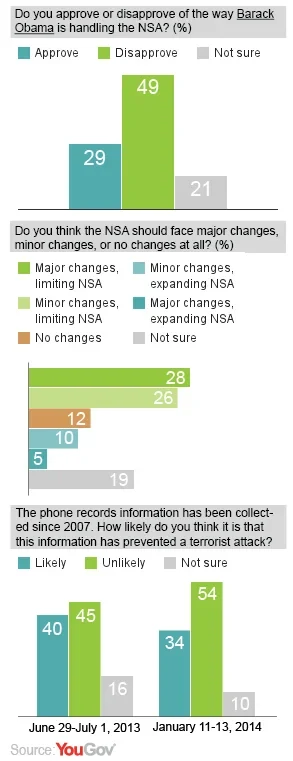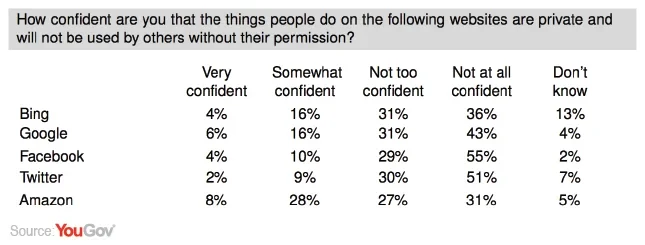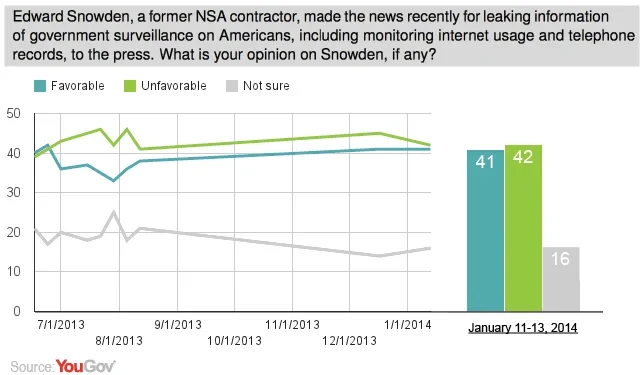Very few Americans trust some of the largest web firms in the country to protect people's privacy, and most want new limits on what the NSA can and can't do
The recommendations of the White House advisory panel reviewing the National Security Agency including setting limits on the agency’s telephone data collection activities, and the latest Economist/YouGov Poll shows that most Americans think such limits are necessary. They agree with the panel in not believing the extensive collection of telephone metadata has made much difference in the war on terrorism. And whatever President Barack Obama says about the agency Friday, he needs to do something. Just 29% of the public approves of the way the President is handling the NSA.

Changes
The expectation is that President Obama is likely to accept many of the committee’s recommendations, and will place limits on what the NSA may collect without a warrant. A majority of the public wants limits: only one in four would make no changes or expand the NSA’s role. Democrats, Republicans and independents agree that there need to be more restrictions on the Agency.
But few expect that the President will set those limits. Just over a third think he will; more expect he will make no changes or even expand the Agency’s role.
Since June, when the Agency’s activities were leaked to the media by a former contractor, Edward Snowden, Americans have objected to the Agency’s activities collecting data in the United States. If anything, their opinions of the Agency only have gotten worse since June. In late June, 55% felt the NSA’s activities were an unnecessary intrusion into Americans’ lives. In this week’s poll, 62% feel that way.
Americans were divided then about whether NSA actions collecting phone records (something it had been doing since 2007) had prevented any terrorist attacks. They since have grown more skeptical. More than half now believe it is unlikely that the NSA’s metadata collection has prevented terrorist attacks.
Americans have concerns about actions taken to increase security, even beyond NSA activities, especially when it comes to judging successes in the war on terror. The public is closely divided on whether efforts the United States (military activities abroad and increased surveillance in the country) have been worth the costs, which may include limits on privacy. Only 41% believe the United States is safer today than it was in 2001.
Online privacy
While the public lacks trust in the NSA (58% believe it is not just collecting metadata, but is also listening in to phone conversations), there is a lack of confidence in many online systems, too.
Majorities don’t have much confidence that the information they provide to major online search engines is going to remain private, and their expectations for privacy is even worse when it comes to sites like Facebook and Twitter: more than half say they are not at all confident the information provided to them remains private.

Amazon fares better; more than a third of the public is at least somewhat confident their information is kept private by the online retailer.
Government websites suffer the same doubts. About six in ten have little or no confidence that healthcare.gov or the Internal Revenue Service will keep their online information private.

Edward Snowden
As for Edward Snowden, the man who leaked the secrets of the NSA, and began the increased scrutiny of the Agency, he may have recovered some in public estimation. Attitudes about Snowden have softened a bit in recent months. Americans originally were divided in their opinions of Snowden, but became unfavorable when he sought asylum in Russia. Now they are once again divided.

They also now divide on whether they approve of the leaking of information about the NSA and whether or not Snowden should be prosecuted for leaking. 43% approve today; 44% disapprove. Republicans and Democrats are more likely to disapprove that approve; majorities of independents and those under 30 approve. In August, a plurality disapproved.
30% would prosecute Snowden for his actions; 32% would not. In August, more would have prosecuted him.
Image: Getty
Full results can be found here.
Economist/YouGov poll archives can be found here.








